External links
- "Underneath" at TheXFiles.com
- "Underneath" at IMDb
| "Underneath" | |
|---|---|
| The X-Files episode | |
| Episode no. | Season 9 Episode 12 |
| Directed by | John Shiban |
| Written by | John Shiban |
| Production code | 9ABX09 |
| Original air date | March 31, 2002 |
| Running time | 44 minutes |
| Guest appearances | |
| |
"Underneath" is the twelfth episode of the ninth season of the American science fiction television series The X-Files . The episode first aired in the United States on March 31, 2002, on the Fox network. The episode was written and directed by executive producer John Shiban. The episode is a "monster-of-the-week" episode, a stand-alone plot which is unconnected to the mythology, or overarching fictional history, of The X-Files. The episode earned a Nielsen rating of 4.4 and was viewed by 4.64 million households and 7.3 million viewers. It received mixed reviews from critics.
The show centers on FBI special agents who work on cases linked to the paranormal, called X-Files; this season focuses on the investigations of John Doggett (Robert Patrick), Monica Reyes (Annabeth Gish), and Dana Scully (Gillian Anderson). In this episode, Doggett is determined to find an error in the DNA evidence that freed the convicted Robert Fassl, the "Screwdriver Killer", whom he nearly caught in the act 13 years earlier. In the end, it is revealed that Fassl has a mental condition that splits him into two parts: the religious innocent and the vengeful killer.
"Underneath" marked the directorial debut of Shiban, who had been a writer for the series for several seasons. Reportedly, the episode contained "so many problems" that the Fox executives nearly refused to allow the finished product to air. At the last minute, however, they relented, and allowed the episode to be aired later on in the season, several weeks after its intended air date. Shiban originally wanted to film the sewer scenes in Los Angeles' actual sewer system, but due to the events of September 11, a sewer mock-up was built on Stage 11 at the Fox studios.
Thirteen years before the present, Robert Fassl (W. Earl Brown) sits in his van. He later approaches a home and claims to be there to repair the cable. As Fassl holds up a piece of paper to show it to the family who called for the repair, blood spatter splashes across the paper. He looks up and sees the house's occupants with slit throats in pools of blood. Abruptly, two police officers burst into the house and apprehend Fassl. One of the officers who goes to check out the kitchen turns to reveal he is John Doggett (Robert Patrick) as a young NYPD officer.
In the present, Monica Reyes (Annabeth Gish) discusses Fassl's release—due to DNA evidence—with an outraged Doggett. Dana Scully (Gillian Anderson) confirms that the test results conclusively disprove Fassl as the killer. Meanwhile, outside the courthouse, Fassl notices a mysterious Bearded Man. After being released, he stays in a room belonging to his lawyer, Jana Fain, where he clutches a Rosary beads and prays frantically. When the Bearded Man appears, Fassl begs for the man not to hurt her. While Fain is unharmed, Fassl learns that the housekeeper, Mrs. Dowdy, has gone missing. Fassl finds her body, cleans up the blood, and dismembers her remains to cover up what has happened.
Scully tells Doggett that while the DNA test disproves Fassl's culpability, it implicates a possible blood relative; Fassl, however, is an only child. Reyes proposes that the murders are being conducted by an entity rather than a person. Meanwhile, Fassl approaches Assistant District Attorney Damon Kaylor and begs to be sent back to prison. Kaylor refuses, but is killed by the Bearded Man. After hearing of Kaylor's disappearance, Reyes theorizes that Fassl's piety and his unwillingness to acknowledge his darker half has given him the unwanted ability to physically change into another, more violent person.
The Bearded Man demands that Fassl kill Fain, beating him up when he doesn't comply. As she tends to Fassl, Fain first sees the Bearded Man in his place. While staking out Fain's house, the agents see the Bearded Man flee. Doggett pursues the Bearded Man while Reyes finds Fain alive. In the pursuit, Reyes falls through into a sewer, where she finds the remains of the Bearded Man's victims. After a struggle with the Bearded Man who is holding Doggett at knife point, Reyes shoots. The Bearded Man falls into the water and Doggett goes after him, only to pull up Fassl, much to his confusion. Reyes tries to remind him that it does not matter as long as the case is solved. [1]
"Underneath" was written and directed by executive producer John Shiban. This marked his directorial debut. [2] According to Shiban, the series' production staff had "actually talked for some time about doing a Jekyll/Hyde story but never quite found a way to do it" until the idea to use DNA came into play. [3] Shiban also was inspired by the film The Third Man (1949), which featured a climactic chase through a sewage system. [3]
The episode, which explores John Doggett's backstory as a New York City police officer, was described as containing similar themes as those "explored on the Millennium series." [4] The episode guest-starred Arthur Nascarella, who was a friend of series co-star Robert Patrick. Patrick was essential in getting Nascarella cast on the show; he later joked "I stole [Nascarella's] New York accent in Copland [ sic ] and I stole it to do The X-Files, but I got him cast in The X-Files show." [4]
As the ninth season progressed and the show's ratings began to plummet, Fox became more and more actively involved in the show's style and direction. [5] Although "Underneath" was the twelfth episode aired, it was actually the ninth episode produced; reportedly, the episode contained "so many problems" that the Fox executives very nearly nixed the finished product. [5] At the last minute, however, they relented, and allowed the episode to be aired later in the season, several weeks after its intended air date. [5]
Shiban originally wanted to film the sewer scenes in Los Angeles' actual sewer system, but the Los Angeles Department of Water and Power vetoed the idea and stated that "there's a moratorium on shooting there since September 11", a position that Shiban called "understandable." [3] In order to make up for this, series art director Corey Kaplan was tasked with building a sewer replica on Stage 11 at the Fox studios; she used the blueprints from the 1952 version of Les Misérables as an inspiration. [3]
"Underneath" first aired in the United States on March 31, 2002, on the Fox network. The episode later debuted in the United Kingdom on February 2, 2003, on BBC One. [6] The episode earned a Nielsen household rating of 4.4, meaning that it was seen by 4.4% of the nation's estimated households and was viewed by 4.64 million households [7] [nb 1] and over 7.3 million viewers. [8] "Underneath" was the 71st most watched episode of television that aired during the week ending March 31. [7]
The episode received mixed reviews from television critics. Jessica Morgan from Television Without Pity gave the episode a B− rating. [9] Robert Shearman and Lars Pearson, in their book Wanting to Believe: A Critical Guide to The X-Files, Millennium & The Lone Gunmen, rated the episode three-and-a-half stars out of five, and called the entry "solid and efficient". [10] The two complimented Shiban's directorial efforts, noting that "as a director [he] makes 'Underneath' shine", but were critical of some of the "trademark X-File moments", citing "the surprise appearance of a face in the bathroom mirror" and "the climactic fight in a sewer" as examples. [10] Shearman and Pearson, however, wrote positively of Shiban's realistic depiction of Doggett. [10] M.A. Crang, in his book Denying the Truth: Revisiting The X-Files after 9/11, wrote that the episode felt "very familiar" but was impressed with the production design on the sewer set. [11]
{{cite AV media notes}}: CS1 maint: others in cite AV media (notes) (link)This article incorporates material derived from the " Underneath " article on the X-Files wiki at Fandom (formerly Wikia) and is licensed under the Creative Commons Attribution-Share Alike License (May 7, 2012).
"Jump the Shark" is the fifteenth episode of the ninth season of the American science fiction television series The X-Files. The episode first aired in the United States on April 21, 2002 on the Fox network. It was written by executive producers Vince Gilligan, John Shiban and Frank Spotnitz, and directed by Cliff Bole. The episode is a "monster-of-the-week" episode—unconnected to the series' wider mythology—and was created to give closure for The Lone Gunmen television series, which was a spin-off of The X-Files. The episode earned a Nielsen rating of 5.1 and was viewed by 8.6 million viewers. The episode received mixed to negative reviews from television critics.

"Sunshine Days" is the eighteenth and penultimate episode of the ninth season of the American science fiction television series The X-Files, and the series' 200th episode overall. It originally aired on the Fox network on May 12, 2002. The entry was written and directed by executive producer Vince Gilligan, his thirtieth and last episode as writer for the series. The episode is a "monster-of-the-week" episode, a stand-alone plot which is unconnected to the mythology, or overarching fictional history, of The X-Files. "Sunshine Days" earned a Nielsen household rating of 6.2, was viewed by 6.5 million households, and 10.4 million viewers in its initial broadcast. It received mixed reviews from television critics.
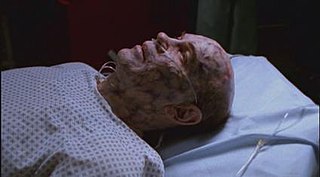
"S.R. 819" is the ninth episode of the sixth season of the science fiction television series The X-Files. It premiered on the Fox network on January 17, 1999, in the United States. The episode was written by John Shiban, and directed by Daniel Sackheim. The episode helps to explore the series' overarching mythology. "S.R. 819" earned a Nielsen household rating of 9.1, being watched by 15.7 million people in its initial broadcast. The episode received mixed to positive reviews from critics.

"Lord of the Flies" is the fifth episode of the ninth season of the science fiction television series The X-Files, and the show's 187th episode overall. It first premiered on the Fox network in the United States on December 16, 2001, and was subsequently aired in the United Kingdom on BBC Two. The episode was written by Thomas Schnauz, and was directed by Kim Manners. The episode is a "monster-of-the-week" episode, a stand-alone plot which is unconnected to the mythology, or overarching fictional history, of The X-Files. "Lord of the Flies" earned a Nielsen household rating of 6.2, and was watched by 9.9 million viewers. The episode received mixed reviews from television critics, with many critical of the episode's reliance on humor.

"Dæmonicus" is the third episode of the ninth season of the American science fiction television series The X-Files and the show's 185th episode overall. It first premiered on the Fox network in the United States on December 2, 2001. The episode was written and directed by executive producer Frank Spotnitz. The episode is a "monster-of-the-week" episode, a stand-alone plot which is unconnected to the mythology, or overarching fictional history, of The X-Files. The episode earned a Nielsen rating of 5.5 and its premiere was viewed by 5.80 million households. The episode received mixed reviews from television critics.
"Trust No 1" is the sixth episode of the ninth season of the American science fiction television series The X-Files. It premiered on the Fox network on January 6, 2002. The episode was written by series creator Chris Carter and executive producer Frank Spotnitz, and directed by Tony Wharmby. "Trust No 1" helps to explore the series' overarching mythology. The episode received a Nielsen household rating of 5.1 and was viewed by 8.4 million viewers; it garnered mixed to negative reviews from television critics, with many feeling that it portrayed the series' characters in a way that was unfaithful to the show's history.
"Providence" is the tenth episode of the ninth season of the American science fiction television series The X-Files. It premiered on the Fox network on March 10, 2002, and later aired in the United Kingdom on BBC One on January 19, 2003. The episode was written by series creator Chris Carter and executive producer Frank Spotnitz, and directed by Carter. "Providence" helps to explore the series' overarching mythology. The episode earned a Nielsen household rating of 5.2 and was viewed by 8.4 million viewers. The episode received mixed reviews from critics; some reviewers enjoyed the story and the show's way of integrating an absent Fox Mulder into the storyline, whereas others felt the plot was ludicrous.
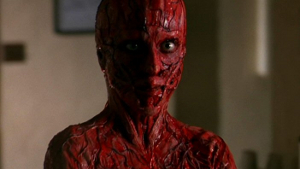
"Hellbound" is the eighth episode of the ninth season of the American science fiction television series The X-Files. It originally aired on the Fox network on January 27, 2002. It was written by David Amann and directed by Kim Manners. The episode is a "monster-of-the-week" episode, a stand-alone plot which is unconnected to the series' wider mythology, or the overarching fictional history. The episode earned a Nielsen household rating of 5.1 and was viewed by 7.8 million viewers in its initial broadcast. It received positive reviews from television critics.
"Provenance" is the ninth episode of the ninth season of the American science fiction television series The X-Files. It premiered on the Fox network on March 3, 2002. The episode was written by series creator Chris Carter and executive producer Frank Spotnitz, and directed by Kim Manners. "Provenance" helps to explore the series' overarching mythology. The episode received a Nielsen household rating of 5.5 and was watched by 5.8 million households and 9.7 million viewers. It received mixed to positive reviews from critics.
"Scary Monsters" is the fourteenth episode of the ninth season of the American science fiction television series The X-Files. It originally aired on the Fox network on April 14, 2002. It was written by Thomas Schnauz and directed by Dwight H. Little. The episode is a "monster-of-the-week" episode, a stand-alone plot which is unconnected to the mythology, or overarching fictional history, of The X-Files. The episode earned a Nielsen household rating of 5.1 and was viewed by 8.2 million viewers in its initial broadcast. It received mixed to positive reviews from television critics.
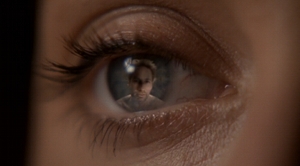
"William" is the sixteenth episode of the ninth season of the American science fiction television series The X-Files, which originally aired on the Fox network on April 28, 2002. The teleplay of the episode was written by series creator Chris Carter, from a story by former series star David Duchovny, Carter, and executive producer Frank Spotnitz; the entry was directed by Duchovny. "William" helps to explore the series' overarching mythology. The episode received a Nielsen household rating of 5.8, being watched by 6.1 million households and 9.3 million viewers upon its initial broadcast. It received mixed reviews from television critics, many of whom were unhappy with the episode's conclusion.
"Release" is the seventeenth episode of the ninth season of the American science fiction television series The X-Files. The episode originally aired on the Fox network on May 5, 2002. The teleplay for the episode was written by David Amann, from a story by John Shiban and Amann, and was directed by Kim Manners. The episode helps to explore one of the show's story arcs involving John Doggett finding the truth behind his son's murder. The episode earned a Nielsen rating of 5.1, being watched by 5.38 million households, and 7.8 million viewers in its initial broadcast. The episode received largely positive reviews from critics.
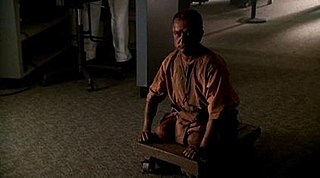
"Badlaa" is the tenth episode of the eighth season of the American science fiction television series The X-Files. It premiered on the Fox network on January 21, 2001. The episode was written by John Shiban and directed by Tony Wharmby. "Badlaa" is a "Monster-of-the-Week" story, unconnected to the series' wider mythology. The episode received a Nielsen rating of 7.3 and was viewed by 11.8 million viewers. Overall, the episode received mostly negative reviews from critics.
"Essence" is the twentieth and penultimate episode of the eighth season and the 181st episode overall of the science fiction television series The X-Files. The episode first aired in the United States on May 13, 2001, on Fox, and subsequently aired in the United Kingdom. It was written by executive producer Chris Carter and directed by Kim Manners. "Essence" earned Nielsen rating of 7.7 and was viewed by 12.8 million viewers. The episode received largely positive reviews from critics.
"Alone" is the nineteenth episode of the eighth season and the 180th episode overall of the science fiction television series The X-Files. The episode first aired in the United States on May 6, 2001 on Fox, and subsequently aired in the United Kingdom on Sky1 on June 14, 2001. It was written and directed by executive producer Frank Spotnitz. "Alone" earned a Nielsen household rating of 7.5 and was viewed by 12.7 million viewers. It received mixed to positive reviews from television critics.
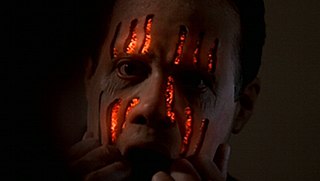
"Empedocles" is the seventeenth episode of the eighth season of the American science fiction television series The X-Files. It premiered on the Fox network on April 22, 2001. The episode was written by Greg Walker and directed by Barry K. Thomas. "Empedocles" is a "Monster-of-the-Week" story, unconnected to the series' wider mythology. The episode received a Nielsen rating of 7.3 and was viewed by 7.46 million households and over 12.46 million viewers. Overall, the episode received mixed reviews from critics.
"Per Manum" is the thirteenth episode of the eighth season of the American science fiction television series The X-Files. It premiered on the Fox network on February 18, 2001. Written by Frank Spotnitz and series creator Chris Carter, and directed by Kim Manners, the episode helps to explore the series' overarching mythology. "Per Manum" received a Nielsen rating of 9.4 and was watched by 9.61 million households. Overall, the episode received mostly positive reviews from critics.
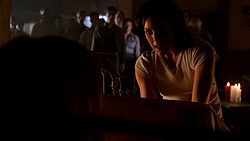
"Existence" is the twenty-first episode and final episode of the eighth-season of the science fiction television series The X-Files and 182nd episode overall. The episode first premiered on Fox in the United States on May 20, 2001, and subsequently aired in the United Kingdom on June 28, 2001, on Sky1. It was written by executive producer Chris Carter and directed by Kim Manners. "Existence" earned a Nielsen household rating of 8.4 and was watched by 8.58 million households and 14 million viewers, overall. The episode received largely positive reviews from television critics.

"This Is Not Happening" is the fourteenth episode of the eighth season and the 175th episode overall of the science fiction television series The X-Files. The episode first aired in the United States on February 25, 2001, on the Fox Network, and subsequently aired in the United Kingdom. It was written by executive producers Chris Carter and Frank Spotnitz, and directed by Kim Manners, and forms part of the series' overarching mythology. The episode received a Nielsen household rating of 9.7 and was watched by 16.9 million viewers, making it the highest-rated episode of the season. "This Is Not Happening" was received positively by television critics.
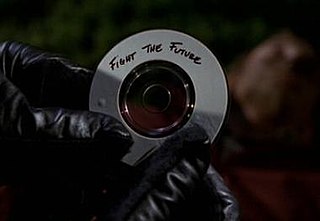
"Three Words" is the sixteenth episode of the eighth season of the science fiction television series The X-Files. It first aired in the United States and Canada on April 8, 2001, on Fox. Written by executive producers Chris Carter and Frank Spotnitz, and directed by Tony Wharmby, it explores the series' overarching mythology. It earned a Nielsen rating of 7.6, viewed by 7.77 million households, and received mixed to positive reviews from television critics.